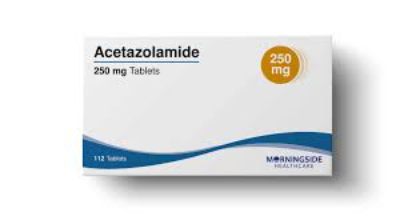


Glaucoma
Oedema
Treatment of all forms of epilepsy
Altitude sickness: prophylaxis
neonates
8mg/kg to 30mg/kg a day, given in divided doses.
Maximum dose: 750mg a day.
The following alternate dosing schedule may be suitable:
250mg to be given 2 to 4 times daily
Initial dose: 2.5mg/kg to be given 2 to 3 times daily.
Maintenance dose: 5mg/kg to 7mg/kg to be given 2 to 3 times daily.
Maximum dose: 750mg day.
250mg to be given 2 to 4 times daily.
5mg/kg to be given 2 to 4 times daily, adjusted according to individual patient response.
Maximum dose: 750mg a day.
Initial dose: 8mg/kg to be given three times daily (maximum daily dose 100mg/kg).
Adrenal insufficiency
Hepatic cirrhosis
Hyperchloraemic acidosis
Hypokalaemia
Hyponatraemia
Long term use in chronic non-congestive narrow angle glaucoma
Pregnancy
Severe hepatic impairment
Severe renal impairment
Elderly
Impaired glucose tolerance
Breastfeeding
Diabetes mellitus
Disorder of acid-base balance
Electrolyte imbalance
Hepatic impairment
History of nephrolithiasis
Obstructive pulmonary disease
Pulmonary emphysema
Renal impairment
Urinary obstruction
Reduce dose in patients with moderate renal impairment
Advise ability to drive/operate machinery may be affected by side effects
Diuresis is not dose-related
Blood counts should be performed before and periodically during treatment
Monitor serum electrolytes before and during treatment
Consider AGEP if feverish generalised erythema occurs
Advise patients to report any unusual rash to the prescriber
Advise patients/carers to seek medical advice if suicidal intent develops
Discontinue if hypersensitivity reactions occur
Discontinue immediately if any severe fall in blood counts occur
Discontinue permanently if AGEP is diagnosed
Acetazolamide is contraindicated during pregnancy.
The manufacturer does not recommend using acetazolamide during pregnancy. Animal studies have shown teratogenic effects at doses in excess of ten times those recommended in humans. Human data is limited and as such a potential risk cannot be ruled out.
Use acetazolamide with caution during breastfeeding.
The manufacturer advises caution if acetazolamide is used when breastfeeding. Whilst available data indicates acetazolamide is present in human breast milk, the quantity is not considered to be sufficient to cause adverse effects in the breastfed infants. Effects in exposed infants are unknown.
Abnormal liver function
Acute generalised exanthematous pustulosis
Agranulocytosis
Anaphylaxis
Aplastic anaemia
Ataxia
Bone marrow depression
Cholestatic jaundice
Confusion
Convulsions
Crystalluria
Depression
Diarrhoea
Dizziness
Drowsiness
Electrolyte disturbances
Erythema multiforme
Fatigue
Fever
Flaccid paralysis
Flushing
Fulminant hepatic necrosis
Glycosuria
Haematuria
Headache
Hearing disturbances
Hepatitis
Irritability
Leukopenia
Melaena
Metabolic acidosis
Myopia
Nausea
Nephrolithiasis
Pancytopenia
Paraesthesia
Photosensitivity
Polyuria
Rash
Reduced libido
Renal colic
Renal failure
Renal lesions
Stevens-Johnson syndrome
Taste disturbances
Thirst
Thrombocytopenia
Thrombocytopenic purpura
Tingling in extremities
Tinnitus
Toxic epidermal necrolysis
Ureteral colic
Urticaria
Vomiting